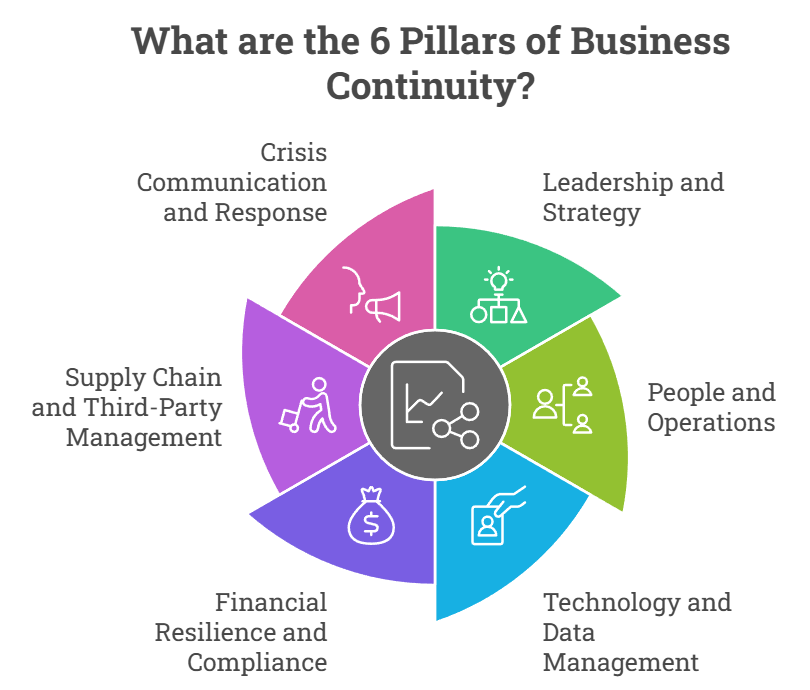What are the 6 Pillars of Business Continuity? Expert Guide

What are the 6 Pillars of Business Continuity? Best Guide
When disruptions hit, companies need a strong plan to keep running and bounce back fast. This is where business continuity planning comes in. But what are the main pillars of a good business continuity strategy? Ark Solvers, a top provider of resilience solutions, offers a detailed guide to the six key pillars of business continuity management (BCM).
Key Takeaways
- Discover the six crucial pillars of effective business continuity planning
- Understand the core components of Business Continuity Management (BCM)
- Explore modern approaches to building business resilience
- Learn how to integrate risk management and strategic planning for continuity
- Gain insights into people-centric and technology-driven continuity strategies

Understanding Business Continuity Management (BCM)
In today’s fast-changing business world, keeping operations running smoothly is key. Business Continuity Management (BCM) is a detailed plan that helps companies prepare for and handle disruptions. It keeps their operations safe and helps them stay ahead of the competition.
Read More: What is Business Continuity? A Complete Guide
Core Components of BCM
BCM’s main parts are risk assessment, business impact analysis, recovery strategies, and incident response planning. By spotting potential dangers and their effects, companies can make strong recovery strategies. This ensures their operational resilience and keeps their business running smoothly.
Evolution of Business Continuity Practices
Business continuity practices have changed significantly over time. They’ve moved from reacting to disasters to a more active, all-around operational continuity approach. Ark Solvers, a top business continuity solution provider, sees this change and stresses the need to include BCM in a company’s overall operational resilience framework.
Modern Approaches to Business Resilience
- Embracing a culture of preparedness and agility
- Leveraging data and technology to enhance recovery strategy and decision-making
- Fostering collaborative partnerships and four pillars of resilience
- Regularly testing and updating business continuity plans
By using these new methods, companies can become more resilient. They can better handle and bounce back from different disruptions, keeping their operations safe and helping them stay competitive in the market.
What are the 6 Pillars of Business Continuity?
Business continuity is key to keeping a company strong against big risks and crises. A complete view of business continuity management (BCM) is vital at Ark Solvers. This view has six main parts that help a business stay strong and flexible.
The six pillars of business continuity at Ark Solvers are:
- Leadership and Strategy: Building a solid base with leader support, planning, and risk handling.
- People and Operations: Make sure your team is ready and strong.
- Technology and Data Management: Safeguarding your digital world, data, and online safety.
- Financial Resilience and Compliance: Keeping your finances stable and following rules.
- Supply Chain and Third-Party Management: Checking vendor risks and finding new suppliers.
- Crisis Communication and Response: Creating good plans for crisis talks and actions.
Experts can make a business more resilient by focusing on these six areas. This strategy helps reduce the effects of big risks like natural disasters, cyber-attacks, or supply chain problems and helps businesses stay on track, even when unexpected issues arise.
Leadership and Strategy: The Foundation Pillar
At Ark Solvers, business continuity starts with strong leadership and planning. A resilient organization needs a dedicated executive team and good business planning, risk assessment, and communication strategies.
Executive Commitment and Support
Top-level support is key to business continuity success. Ark Solvers’ leaders are fully committed to the company’s long-term success. They promote business continuity, provide resources, and empower their teams to make plans work.
Strategic Planning and Implementation
Ark Solvers’ business continuity plan matches our corporate goals. Our strategy includes a detailed business impact analysis (BIA) to spot key functions and risks. This helps us create strong business planning and communication plans for smooth operations in crises.
Risk Management Integration
Risk assessment is central to Ark Solvers’ business continuity efforts. We actively find, analyze, and reduce risks to our operations. This approach makes our strategies flexible and ready for new risks. Risk management is a big part of our business, from big decisions to everyday work.
People and Operations: The Human Element
At Ark Solvers, we know that people are the heart of business continuity planning. Our plan’s “people and operations” part highlights the importance of employees who keep the organization strong during tough times.
Creating a culture of readiness begins with leadership and roles. Our top leaders are deeply involved in planning for business continuity and ensure everyone feels responsible. Employees learn about emergency plans and are assigned specific tasks to help test our strategies smoothly.
- Comprehensive employee training programs
- Clearly defined roles and responsibilities during disruptions
- Regular drills and simulations to enhance operational readiness
But people are more than just parts of the plan. They are the ones who make it work. We build a sense of ownership by giving our team the power to make decisions. This is key to getting through hard times.
At Ark Solvers, we see the human side as the base of true business strength. By focusing on our people and building a readiness culture, we ensure our operations can face any challenge.
Technology and Data Management
In today’s world, technology and good data management are key for businesses to keep going. At Ark Solvers, we know how important they are. They help your business stay strong, even when things get tough.
Digital Infrastructure Protection
Keeping your digital stuff safe is a must. This means protecting your servers, networks, and important software from problems. With strong security and regular checks, you can avoid downtime and keep your digital stuff safe.
Data Backup and Recovery Systems
Good backup and recovery systems are essential for any business. Ark Solvers helps you set up solid backup plans, like cloud or on-site storage. If you lose data or systems fail, these systems help get your info back fast, keeping your business running smoothly.
Cybersecurity Measures
Cyber threats are worsening, so keeping your business safe online is vital. Ark Solvers helps you set up strong security, like firewalls and training for your team. This way, you can protect your data and keep your business safe from cyber-attacks.
Ark Solvers helps businesses build strong systems that can handle digital challenges. Our solutions make sure your business is ready for any disruption. This keeps your data, technology, and business safe.
Financial Resilience and Compliance
At Ark Solvers, we know how important financial planning and following rules are for businesses. In today’s world, staying financially strong and following laws can mean the difference between success and struggle.
Being financially resilient means running your business smoothly, even when things get tough. This includes managing money well, making smart budgets, and being ready to change when the market does. Ark Solvers helps its clients stay strong by establishing strong financial systems and finding new money-making methods.
Compliance is also key for keeping a business going. Companies must follow many laws and rules, from maintaining safe data to reporting finances. Ark Solvers works with its clients to determine what rules they must follow and how to meet them. This way, they can avoid big fines and keep their good name intact, so they can focus on what they do best.
Ark Solvers excels at combining financial strength with the following rules. We help our clients become stable and flexible, setting them up for long-term success. Through careful planning, risk management, and ethical business practices, Ark Solvers gives its clients the confidence to handle the changing world of finance and compliance.
Supply Chain and Third-Party Management
Managing supply chains and third-party partnerships is key in today’s business world. Ark Solvers, a top business resilience consulting firm, stresses the need to tackle supply chain problems and protect reputation. They suggest using strategic methods to do so.
Vendor Risk Assessment
Ark Solvers tells companies to conduct deep vendor risk assessments. This helps them spot weak spots in their supply chain. They examine suppliers’ financial health, operational strength, and cybersecurity.
Knowing the risks, businesses can choose to work with more suppliers and plan for when things go wrong.
Alternative Supplier Strategies
Ark Solvers suggests having backup plans for suppliers. This means finding other suppliers, using multiple sources, or looking closer home. This way, companies can keep running smoothly despite supply chain problems.
Partnership Continuity Planning
Ark Solvers also talks about planning for partnerships to keep things running smoothly. This includes working with vendors, setting up communication plans, and testing readiness. Strong partnerships help businesses stay strong and avoid damage to their reputation.
By being proactive in managing supply chains and partnerships, companies can improve their business plans, better handle the challenges of supply chain issues, and protect their reputation.
Crisis Communication and Response
Businesses need to be ready for unexpected crises, such as cyber-attacks or natural disasters. At Ark Solvers, we know how vital a strong crisis communication plan is. It helps keep employees safe and operations running smoothly.
We quickly share information with everyone involved, including employees, customers, and the wider community. We have clear channels and rules to ensure the right people get the right information at the right time, which helps us work together smoothly during emergencies.
Our crisis management plan includes important parts:
- A dedicated team for crisis communication with clear roles
- Updated contact lists for all stakeholders
- Templates ready for different crises, like cyber attacks and natural disasters
- Backup ways to communicate in case of failures
- Drills and simulations to test our plan
Ark Solvers is ready to handle any crisis quickly and effectively. This protects our operations and maintains the trust of our customers and partners.
Implementation Strategies for Business Continuity
Creating a solid business continuity plan is key for small businesses. It helps them avoid disruptions and grow in the long run. The team at Ark Solvers has outlined three main steps for small businesses to follow.
Assessment and Planning Phase
The first step is to assess your business’s operations, risks, and weaknesses. You need to identify what’s most important, the threats you face, and where you need more time to be ready. This helps you make a plan that fits your business’s specific needs.
Training and Documentation
After planning, it’s important to train your employees on the plan. They need to know their roles and what to do in a crisis. Regular practice and updates help everyone stay on track and improve the plan.
Regular Testing and Updates
Business continuity plans must be tested and updated often. Small businesses should review their plans regularly to ensure they stay effective as their business and the world around them change.
Small businesses need a strong business continuity plan. By following these steps, they can become more resilient, handling disruptions and growing over time.
Common Threats to Business Continuity
In today’s world, businesses face many threats, from natural disasters to cyberattacks. At Ark Solvers, we focus on helping our clients stay strong and resilient.
Natural disasters like floods and hurricanes are big threats. They can damage buildings and disrupt operations. We help our clients prepare with backup plans and alternative suppliers.
Cyberattacks are another big risk. Hackers target data and systems, which can stop a business from working. We give our clients strong cybersecurity tools to keep their data safe.
Also Read,
- Why is Cyber Security Important for Modern Business Safety?
- Essential Cyber Security Services for Small Business
- Business Assets: Network Security for Small Business
- Managed IT Services for Small Businesses
- How Can Small Businesses Benefit From Cloud Computing?
FAQ
What are the six pillars of business continuity?
The six pillars of business continuity are:
1. Leadership and Strategy
2. People and Operations
3. Technology and Data Management
4. Financial Resilience and Compliance
5. Supply Chain and Third-Party Management
6. Crisis Communication and Response
What are the core components of Business Continuity Management (BCM)?
The core components of Business Continuity Management (BCM) include:
1. Risk management
2. Business impact analysis
3. Recovery strategies
4. Incident response
5. Planning for critical business functions
How has business continuity planning evolved?
Business continuity planning has changed a lot. It used to focus mainly on disaster recovery. Now, it’s more about building resilience to handle different disruptions.
What are the modern approaches to building business resilience?
Today, building business resilience involves:
1. Using operational resilience frameworks
2. Adopting agile recovery strategies
3. Integrating risk management across the organization
Why is executive commitment and support critical for effective business continuity?
Executive support is key to good business continuity. It ensures the right resources and funding are available, which helps implement and maintain a strong business continuity program.
How can organizations integrate risk management into their business continuity strategies?
To integrate risk management, organizations should:
1. Do thorough risk assessments
2. Perform business impact analyses
3. Align continuity plans with identified risks and impacts
What is the role of employee training and testing in ensuring effective business continuity?
Training and testing are vital. They help ensure employees know their roles in a crisis, ensuring plans work well and can be executed smoothly.
How can organizations protect their digital infrastructure and data during disruptions?
To protect digital infrastructure and data, organizations should:
1. Use strong data backup and recovery systems
2. Improve cybersecurity
3. Make sure critical IT systems and networks are resilient
What are the key considerations for maintaining financial resilience during a crisis?
To keep finances stable during a crisis, consider:
1. Having emergency funding
2. Managing cash flow well
3. Reducing financial liabilities
4. Following regulatory and compliance rules
How can organizations effectively manage supply chain and third-party risks?
To manage risks, organizations should:
1. Assess vendor risks
2. Have backup supplier plans
3. Plan for partnership continuity
What are the essential elements of a comprehensive crisis communication plan?
A good crisis communication plan should have the following:
1. Clear communication channels
2. Pre-set messaging and protocols
3. Designated spokespersons
4. Quick information sharing with stakeholders


